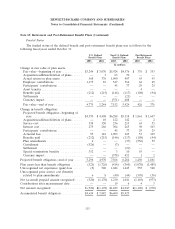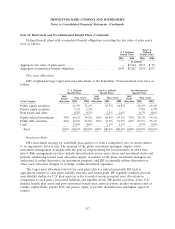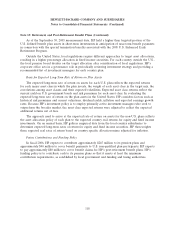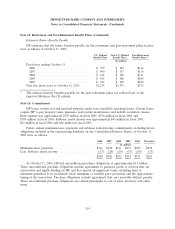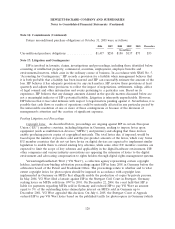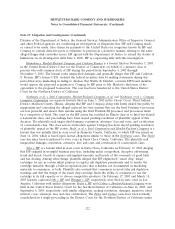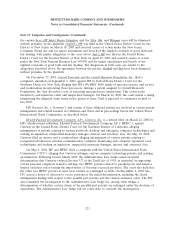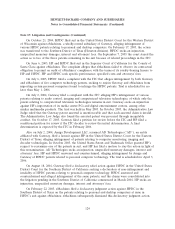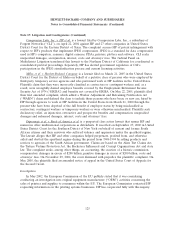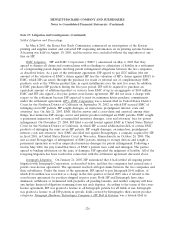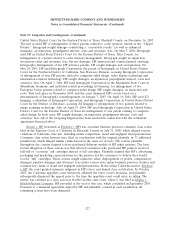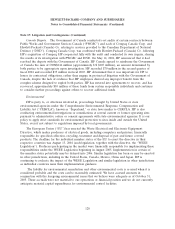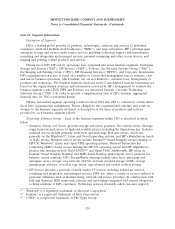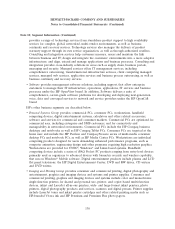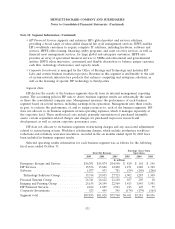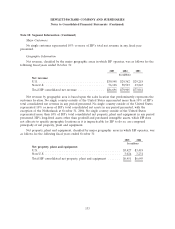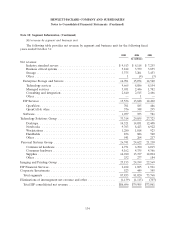HP 2005 Annual Report Download - page 129
Download and view the complete annual report
Please find page 129 of the 2005 HP annual report below. You can navigate through the pages in the report by either clicking on the pages listed below, or by using the keyword search tool below to find specific information within the annual report.
HEWLETT-PACKARD COMPANY AND SUBSIDIARIES
Notes to Consolidated Financial Statements (Continued)
Note 17: Litigation and Contingencies (Continued)
Compression Labs, Inc. v. HP et al. is a lawsuit filed by Compression Labs, Inc., a subsidiary of
Forgent Networks (‘‘CLI’’), on April 22, 2004 against HP and 27 other companies in United States
District Court for the Eastern District of Texas. The complaint accuses HP of patent infringement with
respect to HP’s products that implement JPEG compression. JPEG is a standard for data compression
used in HP’s computers, scanners, digital cameras, PDAs, printers, plotters and software. CLI seeks
unspecified damages, an injunction, interest, costs and attorneys’ fees. The Judicial Panel on
Multidistrict Litigation transferred this lawsuit to the Northern District of California for coordinated or
consolidated pretrial proceedings. Separately, HP has alerted government regulators of CLI’s
participation in the JPEG standardization process and current licensing activities.
Miller, et al. v. Hewlett-Packard Company is a lawsuit filed on March 21, 2005 in the United States
District Court for the District of Idaho on behalf of a putative class of persons who were employed by
third-party temporary service agencies and who performed work at HP facilities in the United States.
Plaintiffs claim that they were incorrectly classified as contractors or contingent workers and, as a
result, were wrongfully denied employee benefits covered by the Employment Retirement Income
Security Act of 1974 (‘‘ERISA’’) and benefits not covered by ERISA. On May 22, 2005, plaintiffs filed
their first amended complaint, which added a Worker Adjustment and Retraining Notification Act
(‘‘WARN’’) claim and defined the class to include those persons who have been, or now are, hired by
HP through agencies to work at HP facilities in the United States from March 21, 2000 through the
present who have been deprived of the full benefit of employee status by being misclassified as
contractors, contingent workers or temporary workers or were otherwise misclassified. Plaintiffs seek
declaratory relief, an injunction, retroactive and prospective benefits and compensation, unspecified
damages and enhanced damages, interest, costs and attorneys’ fees.
Digwamaje et al. v. Bank of America et al. is a purported class action lawsuit that names HP and
numerous other multinational corporations as defendants. It was filed on September 27, 2002 in United
States District Court for the Southern District of New York on behalf of current and former South
African citizens and their survivors who suffered violence and oppression under the apartheid regime.
The lawsuit alleges that HP and other companies helped perpetuate, profited from, and otherwise
aided and abetted the apartheid regime during the period from 1948-1994 by selling products and
services to agencies of the South African government. Claims are based on the Alien Tort Claims Act,
the Torture Victims Protection Act, the Racketeer Influenced and Corrupt Organizations Act and state
law. The complaint seeks, among other things, an accounting, the creation of a historic commission,
compensatory damages in excess of $200 billion, punitive damages in excess of $200 billion, costs and
attorneys’ fees. On November 29, 2004, the court dismissed with prejudice the plaintiffs’ complaint. On
May 2005, the plaintiffs filed an amended notice of appeal in the United States Court of Appeals for
the Second Circuit.
Investigation
In May 2002, the European Commission of the EU publicly stated that it was considering
conducting an investigation into original equipment manufacturer (‘‘OEM’’) activities concerning the
sales of printers and supplies to consumers within the EU. The European Commission contacted HP
requesting information on the printing systems businesses. HP has cooperated fully with this inquiry.
125


